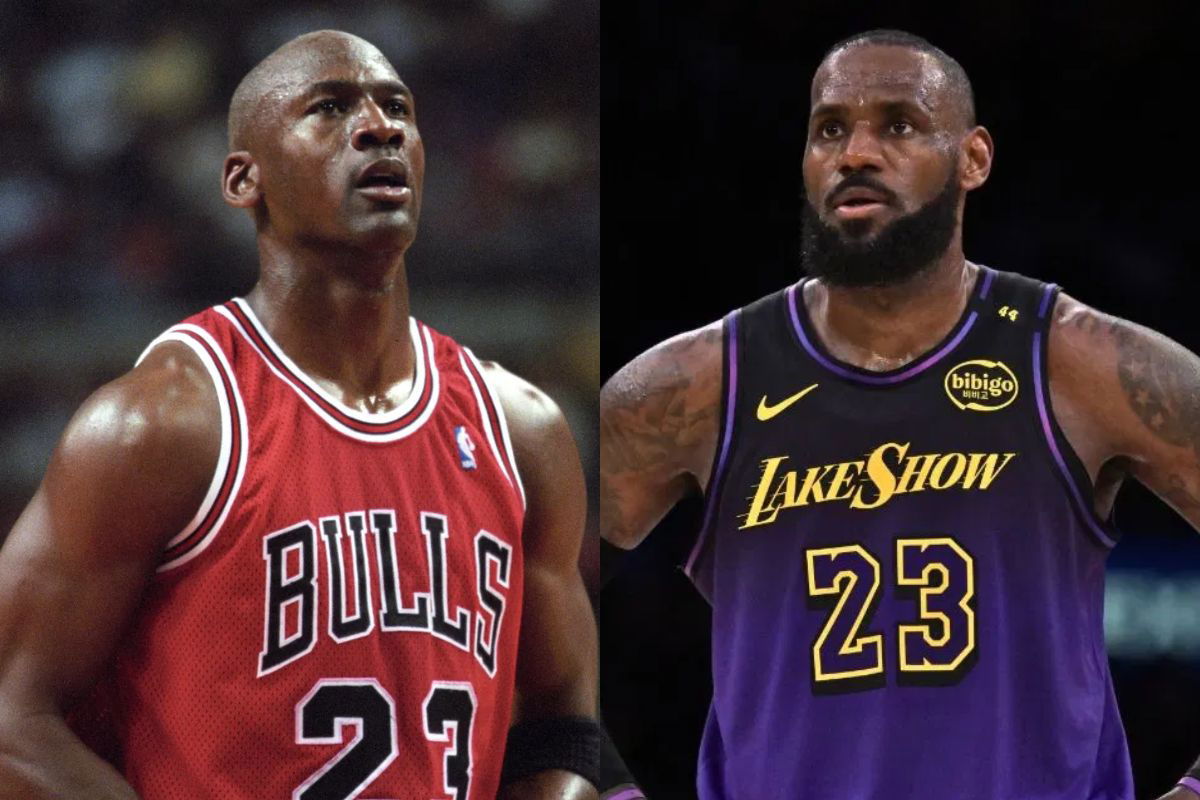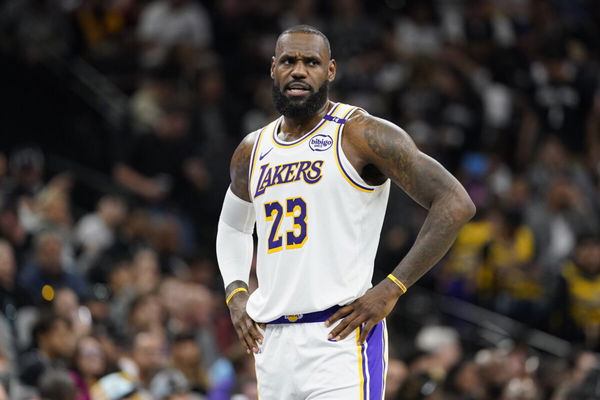
Imago
Image Credits – IMAGN

Imago
Image Credits – IMAGN
Mark Cuban, the former majority owner of Dallas, flipped the GOAT debate on its head with a take that’s hard to ignore. “If you have a good team and you need a killer, you go MJ. If you have a team that’s good and you want them to be better, and as a team get to the Finals, you go LeBron. MJ is not going to lift up a bad team; LeBron can,” Cuban said on The Arena. To him, arguing who’s better is pointless—they’re built for different jobs. Jordan’s the closer, and LeBron’s the elevator. And Cuban swears that’s the only way the debate really makes sense, with an ex-NBA star backing him up.
Watch What’s Trending Now!
Eddie A. Johnson even jumped in on X to back Cuban’s view. “That right there is the separator they don’t wanna hear. It’s not being critical of the unreal maniacal amazing MJ. You can put Magic and Bird in that same separator,” Johnson wrote. And the truth is, Jordan’s résumé backs that reputation up. He went a perfect 6–0 in the NBA Finals, never even needing a Game 7. Over 306 career games, he shot 45.7% overall (3,031/6,636) and 31.5% from three (167/531)—numbers that fueled his dominance as the ultimate closer. Teammates knew he would always demand and take the biggest shots, even if that meant not always spreading the burden.
LeBron James, on the other hand, carved out a different lane. He’s the ultimate playmaker, the guy who makes everyone around him better. Remember 2007 and 2018? Two very different Cavaliers teams, a decade apart, but the same outcome: LeBron James dragging them to the NBA Finals.
ADVERTISEMENT
That right there is the separator they don’t wanna hear. It’s not being critical of the unreal maniacal amazing MJ. You can put Magic a Bird in that same separator. https://t.co/h387n0xjMs
— Eddie A Johnson (@Jumpshot8) September 10, 2025
In 2007, LeBron carried a young, unproven Cleveland squad with no All-Star teammates. He dismantled the Detroit Pistons in the Eastern Conference Finals—dropping 48 points in Game 5, scoring 29 of Cleveland’s final 30 points, and announcing himself as the league’s ultimate force of will. The Cavs were swept by San Antonio in the Finals, but the run itself was proof of LeBron’s ability to elevate a roster far beyond its true ceiling.

Imago
Nov 15, 2024; San Antonio, Texas, USA; Los Angeles Lakers forward LeBron James (23) during the second half against the San Antonio Spurs at Frost Bank Center. Mandatory Credit: Scott Wachter-Imagn Images
Fast-forward to 2018, after Kyrie Irving’s departure left Cleveland gutted and directionless. The roster was a revolving door—midseason trades shuffled half the rotation, and the team lacked identity. Yet LeBron delivered one of the greatest postseason runs ever: averaging 34.0 points, 9.1 rebounds, and 9.0 assists, including unforgettable moments like the Game 7 dagger over Indiana and the buzzer-beater against Toronto. He willed that undermanned group past Indiana, Toronto, and Boston, dragging them back to the Finals.
Michael Jordan was the more dominant pure scorer, averaging 30.1 points per game with 49.7% FG, 83.5% FT, a 32.7% 3P, and the highest-ever 27.9 PER, proving unmatched scoring efficiency, while LeBron James balanced efficiency with all-around impact, posting 27.0 points, a higher 50.6% FG and 54.8% eFG%, along with 7.5 rebounds and 7.4 assists per game; Jordan’s 214.0 win shares came in fewer games, but LeBron’s 271.4 win shares highlight his longevity and ability to combine elite scoring with team-oriented playmaking, making MJ the ultimate efficient scorer and LeBron the more complete team engine.
Mark Cuban isn’t the only one praising LeBron’s team game, former Hawks point guard Jeff Teague told Club 520, “I think that’s what makes him so great, is that he can elevate teams… Even Mike couldn’t do that. ‘I’ll win the game by myself,’ but he really didn’t make people better.” LeBron’s selflessness is real—he even hates one-on-one games, saying, “It bothers the f— out of me. Everyone thinks just because you get a favorable matchup, then it’s 1v1 time… ‘You wanna play ones?’ What the f—- is this?… it’s five on five.”
And the stats back it up: LeBron James is the only player in NBA history with 30,000 points, 10,000 rebounds, and 10,000 assists. He ranks second in career playoff assists and is a top assist leader in NBA Finals history. He ranks fourth in career assists and sixth in steals, proving his elite all-around, team-oriented game.
Similarly, looking at the numbers, Magic Johnson was the definition of a team player—11.2 assists per game over his career is unreal, and it came with 52.0% shooting and an 84.8% free-throw clip, proving he scored efficiently when needed but lived to set others up.
Larry Bird, meanwhile, was the more natural scorer, putting up 24.3 points a night with 49.6% FG, an elite 37.6% from three, and an even sharper 88.6% at the line, all while grabbing 10 rebounds and adding 6.3 assists. Bird’s shooting touch makes him the more clutch option—you wanted him taking the last shot—while Magic’s playmaking and vision clearly made him the ultimate team-first superstar. In short: Bird was the cold-blooded closer, Magic the floor general every teammate dreamed of.
Michael Jordan and LeBron James, Clutch, in Different Ways
Michael Jordan wasn’t perfect in clutch moments—far from it. He missed free throws, got blocked at the rim, and passed up potential game-winners more often than most fans remember. But what made him truly elite in those moments wasn’t just his ability to score—it was his ability to read defenses and leverage his gravity when everyone in the building knew the ball was coming to him.
Take the 1993 Finals, Game 6 in Phoenix. Jordan had 33 points, but instead of forcing the last shot against a collapsing defense, he swung the ball to John Paxson, who drilled the series-clinching three. Similarly, in the 1997 Finals, Jordan drew multiple defenders in crunch time before calmly kicking out to Steve Kerr for the dagger jumper.
These plays underline something often overlooked: Jordan was not only a dominant scorer but also a fantastic playmaker in the biggest moments. His willingness to trust teammates under immense pressure amplified Chicago’s championship machine. His gravity warped defenses, and his decision-making—whether shooting or passing—consistently created the best possible shot in crunch time.
That balance between killer instinct and situational trust is what truly defined Jordan’s clutch greatness.
LeBron James, meanwhile, has stacked up stats that make a strong case for him as a clutch performer. According to Nick Wright in 2023, when looking at shots to tie or take the lead in the last minute, LeBron ranks second in field goal percentage, ahead of Jordan (6th) and Kobe (15th), and he also leads in shots taken in the final five seconds of playoff games. Add to that, LeBron holds the record for most clutch shots in NBA history—1,010 across regular season and playoffs.
Jordan famously said, “I’ve missed more than 9,000 shots. I’ve lost almost 300 games. 26 times, I’ve been trusted to take the game-winning shot and missed. I’ve failed over and over and over again in my life. And that is why I succeed.” He brought the Bulls to the map, changed the culture, and proved that greatness isn’t just about never missing—it’s about how you build a team, inspire others, and dominate when it counts.
ADVERTISEMENT
ADVERTISEMENT
ADVERTISEMENT
ADVERTISEMENT